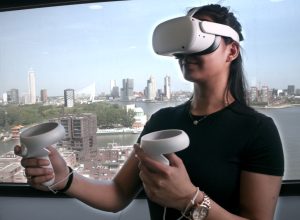
Report on questionnaire for stakeholders
The use of virtual and augmented reality in maritime and inland navigation education is one of the revolutionizing strides in developing computer-assisted instruction. Since the implementation of AR/VR technologies is still relatively new in maritime and inland navigation industry, the 6 partner organisations involved in DERIN project designed a detailed online questionnaire to assess the impact of AR/VR-based education and training in maritime and inland navigation (juxtaposed with the traditional method of teaching) and to analyse the need and growth of these technologies in the industry. Moreover, it investigated the opportunities for AR/VR technologies to improve stakeholders’ communication and identify expert-predicted results.
The online questionnaire was hosted on this link and sent via email to the relevant contacts in the DERIN stakeholder database.
The questions are divided into four sections: (1) general information, (2) AR/VR knowledge and experience, (3) visions for future of AR/VR and (4) risks and limitations addressed to teachers, trainers and assessors, trainees/ students in the sector and professionals & shipping industry stakeholders, forwarders, agents, shipping companies, crewing agencies, port industry as well as technology providers.
A full report on questionnaire for stakeholders concluded that although maritime and especially inland navigation are far behind other industries such as healthcare and retail in adopting AR/VR technologies, waterborne transport sector is willing to change its previous path towards utilizing these technologies.
The answers were analysed to assess the current state, growth, and saving opportunities for AR/VR technologies and the industry experts foresee a strong growth in their over the next 5 to 10 years. Furthermore, the results show a significant increase of interest in the AR/VR utilization in the education and training system in the industry over the past year and potential opportunities.
The general feeling of optimism shows the enormous potential of immersive technology as we enter the third decade of the 21st century. However, there are concerns about the quality of user experience and available content offerings, along with the pace of adoption.
The results of the questionnaire demonstrated that most of respondents are confident about the future of AR/VR technologies and they see multiple benefits in the utilization while the adoption of these technologies is growing significantly in the industry.
The answers to the questionnaire show some inherent limitations in adopting AR/VR, such as the “lack of budget,” “senior management’s lack of understanding of these technologies,” and “lack of knowledge.” One major limiting factor that prevents the maritime and inland navigation industry from adopting AR/VR technologies is the lack of availability of cost/benefit analysis. Organisations are not willing to invest their money without knowing the true costs and benefits (i.e. time and costs/ savings). For further details you are kindly invited to consult HERE the full document DERIN – REPORT ON QUESTIONNAIRE FOR STAKEHOLDERS.



Average Rating